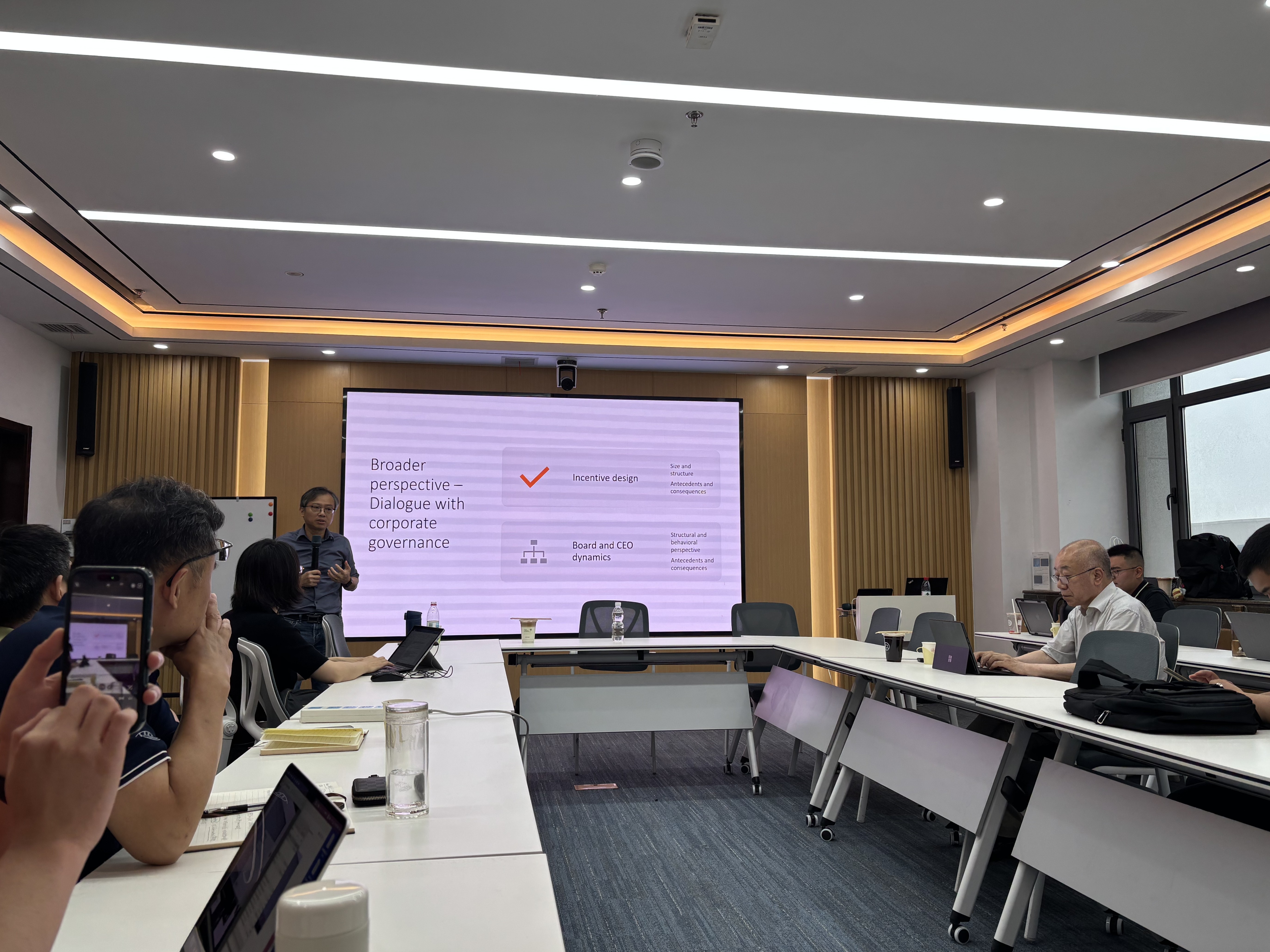On the afternoon of June 26, Professor Guoli Chen from the Institut Européen d'Administration des Affaires (INSEAD) was invited to visit the School of Management, Shandong University, and delivered an academic lecture titled “Upper-Echelons Strategy Research: Historical Evolution and Directions for Future Studies in the AI Era.”The lecture was attended by Professor Wu Changqi , Professor Wang Yimin, Associate Professor Fang Zheng, and Associate Professor Liu Depeng. The session was chaired by Professor Xu Yuehua from the Department of Strategic Management and Innovation and Entrepreneurship.

Professor Chen Guoli, drawing from the classic literature on Upper Echelons Theory (UET), points out that the theory rapidly gained prominence in the field of strategic management precisely because it spotlights the profound impact of top managers' personality traits and cognitive biases on corporate strategy, thereby breaking through the limitations of organizational theories that overemphasize environmental determinism.He then outlined the four-decade evolution of UET, critically analyzing the research focus and potential across subfields: studies on the "CEO effect" are approaching saturation with increasingly stringent publication thresholds, while research on TMT interaction processes remains fertile ground for exploration, in entrepreneurial or family business contexts. He specifically highlighted that CEO emotions, CEO-stakeholder interactions, and incentive mechanism design constitute largely uncharted territories ripe for scholarly exploration.
In the second part of the lecture, Professor Chen posed a forward-looking question: Can AI replace CEOs? He explored this through three key dimensions:First, CEOs not only perform practical managerial duties but also serve as symbolic communicators representing the organization externally.Second, top-level management tasks rely heavily on complex judgment and contextual understanding.Third, corporate performance is typically driven by multiple interdependent factors, whose inherent ambiguity makes precise algorithmic modeling unfeasible.Illustrating with the case of the game company Dota, he acknowledged AI’s potential for enabling organizational decentralization, yet emphasized its inability to replace CEOs or managers in strategic decision-making. The lecture concluded with faculty and students engaging in vibrant discussions on AI’s limitations, the core responsibilities of CEOs, and UET research in the Chinese context.
Chen Guoli is Professor of Strategic Management at Institut Européen d'Administration des Affaires and holds the Mubadala Chair Professorship in Corporate Governance and Strategy. He earned his PhD in Strategic Management from The Pennsylvania State University. Professor Chen teaches "Blue Ocean Strategy," "Competitive Strategy," "China Strategy," "Corporate Strategy," "Corporate Governance," and "Incentive Mechanism Design" across MBA, Executive MBA (EMBA), executive education, and doctoral programs. He is frequently invited as a keynote speaker at academic and industry events. His research primarily focuses on the roles of top management teams and boards of directors in organizational growth, strategic renewal, and sustainable development.His research findings have appeared in numerous globally top-tier academic journals, including but not limited to: Academy of Management Journal, Administrative Science Quarterly, Organization Science, Strategic Management Journal, Management Science, Journal of International Business Studies, and Leadership Quarterly. Multiple papers have received distinguished paper awards at premier academic conferences including the Academy of Management (AOM) Annual Meeting and the Strategic Management Society (SMS) Annual Conference. Additionally, his research insights have gained extensive coverage in leading international media outlets such as Barron's, Bloomberg, The Business Times, China Daily, Financial Times, Forbes, Harvard Business Review (online), The Jakarta Post, South China Morning Post, and The Washington Post.